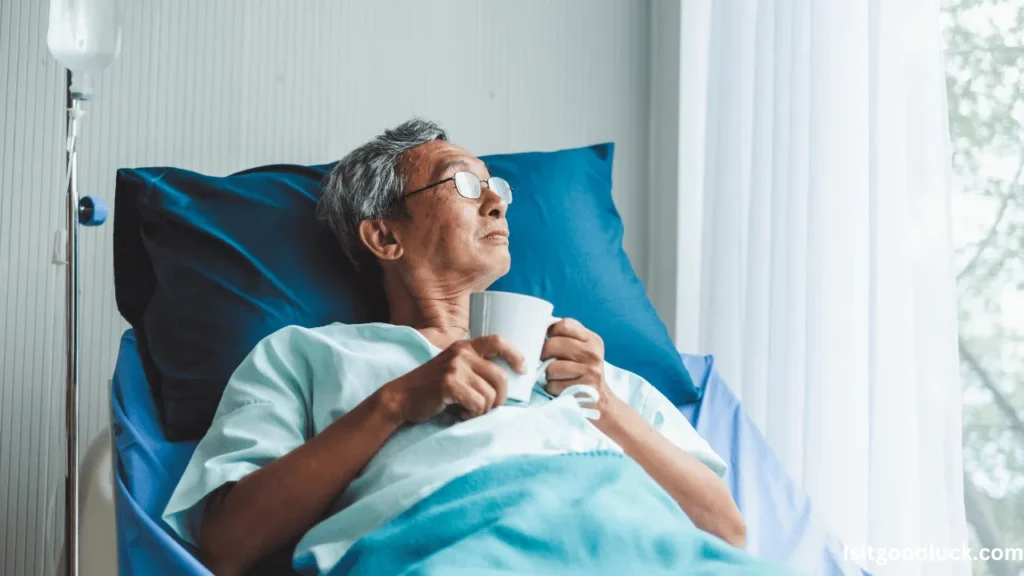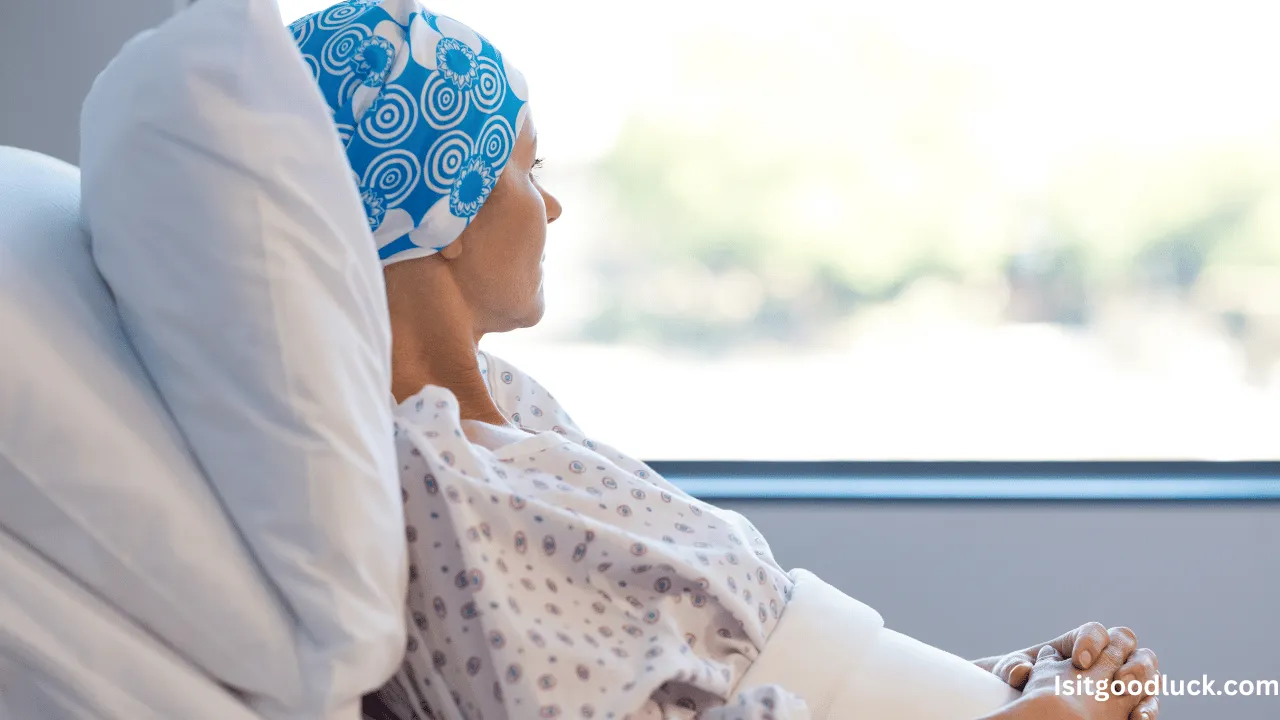When talking to someone with cancer, being mindful of what you say is essential. While wishing someone good luck with their chemo treatment may seem like a kind gesture, it can be a sensitive topic.
Some cancer patients find it irritating or offensive when they hear phrases like “Good luck on your journey.”
It’s essential to consider the individual’s preferences and be sensitive to their needs. It’s best to speak from the heart and offer support in ways that the patient finds meaningful.
Contents
- 1 Key Takeaways:
- 2 What To Say Instead: Providing Meaningful Support During Chemo
- 3 Understanding What Not To Say: Avoiding Harmful Comments
- 4 Offering Practical Help: Acts of Kindness for Cancer Patients
- 5 Respecting Boundaries and Individual Choices: Sensitivity is Key
- 6 Conclusion
- 7 FAQ
- 7.1 Is it okay to wish someone good luck with chemo?
- 7.2 What should I say instead?
- 7.3 What comments should I avoid when communicating with someone undergoing chemotherapy?
- 7.4 How can I support someone with cancer by just being present?
- 7.5 What practical assistance can I offer to cancer patients?
- 7.6 How can I respect boundaries and choices when supporting someone with cancer?
- 8 Source Links
Key Takeaways:
- Wishing someone good luck with chemo can be a sensitive topic for cancer patients.
- It’s essential to consider the individual’s preferences and be sensitive to their needs.
- Offer support in ways that the patient finds meaningful.
- Specific help and understanding can go a long way in providing support during chemo.
- It is vital to create an environment where cancer patients feel safe to share their experiences.
What To Say Instead: Providing Meaningful Support During Chemo
Finding the right words can make a significant difference when supporting someone undergoing chemotherapy. Instead of relying on generic phrases like “good luck,” there are alternative ways to provide meaningful support to make a difference in their journey.
One approach is to offer specific help or assistance based on the person’s needs. This can include practical tasks such as cooking meals, running errands, or accompanying them to appointments. By offering concrete support, you show that you genuinely care and are willing to help tangibly.
Also read: Is it Appropriate to Wish Good Luck Before Child Birth?
In addition to practical assistance, expressing empathy and understanding is crucial. Let the person know you’re there for them, ready to listen and encourage them.
Sharing kind and heartfelt messages can go a long way in boosting their spirits and letting them know they are not alone during this challenging time.
Table: Ways to Provide Meaningful Support During Chemo
| Provide Practical Help | Express Empathy and Understanding |
|---|---|
| Offer to cook meals or run errands | Send words of encouragement and support |
| Accompany them to medical appointments | Listen actively and provide a safe space to share |
| Help with household chores or childcare | Show genuine empathy and understanding |
By providing practical help, expressing empathy, and showing genuine care, you can offer meaningful support to someone going through chemotherapy.
Everyone’s journey is unique, so it’s crucial to be sensitive to their needs and preferences.
Understanding What Not To Say: Avoiding Harmful Comments
When communicating with someone undergoing chemotherapy, it’s essential to be mindful of the impact your words can have.
Specific comments should be avoided as they can be hurtful and insensitive. You can respectfully provide support and comfort by understanding what not to say.
One harmful comment to avoid is suggesting that the person brought their cancer upon themselves. Blaming the individual for their illness can be exceedingly hurtful and dismissive of their experience.
It’s important to remember that cancer is a complex disease with various contributing factors, and it is not the result of personal choices or actions.
Also read: Exploring What Is Between Good Luck and Bad Luck
Another comment to steer clear of is mentioning others who have passed away from the same type of cancer.
Bringing up such experiences can be distressing and may trigger feelings of fear and anxiety in the person going through chemotherapy. Instead, focus on offering encouragement and reassurance.
Remember, your words have the power to either uplift or harm. By avoiding harmful comments and choosing your words carefully, you can provide the support and empathy that someone undergoing chemotherapy truly needs.
Additionally, it’s important not to suggest unproven treatments or question the individual’s lifestyle choices.
Each person’s cancer journey is unique, and treatment decisions are personal and complex. It’s crucial to respect their autonomy and refrain from making judgments or unsolicited advice.

Benefits of Listening:
- Provides emotional support and comfort
- Allows the person to express their feelings openly
- It helps you understand their unique needs and preferences
- Strengthens the bond and trust between you
- Creates a safe space for them to share their concerns
By being present and listening, you can make a remarkable difference in the life of someone undergoing chemotherapy.
Your empathy, understanding, and support can bring them comfort and reassurance during this challenging time. Remember, sometimes, the smallest act of listening can have the most significant impact.
Offering Practical Help: Acts of Kindness for Cancer Patients
When someone you know is undergoing chemotherapy, offering practical help can make a significant difference in their day-to-day life.
By assisting with tasks that may become challenging for them, you can alleviate some of the burdens of cancer treatment. Instead of generic offers like “let me know if I can do anything,” consider specific ways you can lend a hand.
Table: Ideas for Practical Assistance
| Task | How You Can Help |
|---|---|
| Grocery Shopping | Offer to pick up groceries or create a schedule with other friends or family members to ensure the patient has a consistent fresh food supply. |
| Meal Preparation | Prepare and deliver meals that are easy to heat up and provide nourishment during their treatment. |
| Transportation | Offer rides to and from medical appointments or arrange transportation, ensuring they don’t have to worry about logistics. |
| Household Chores | Assist with household chores such as cleaning, laundry, or yard work, which may become challenging for the patient during treatment. |
| Childcare | If the patient has young children, offer to help with childcare, allowing them to focus on their treatment. |
| Pet Care | Take care of their pets by offering to walk their dog, feed their cat, or provide any necessary pet care while they focus on their health. |
By taking the initiative and offering specific assistance, you show your genuine care and support for the person going through chemotherapy.
These acts of kindness can significantly improve their quality of life and allow them to focus on recovery.
Respecting Boundaries and Individual Choices: Sensitivity is Key
When it comes to supporting someone undergoing chemotherapy, it is essential to respect their boundaries and individual choices. Each person’s experience with cancer is unique, and what may be appropriate for one individual may not be for another.
While offering words of encouragement and wishing someone luck may be well-intentioned, it is crucial to consider the preferences and needs of the cancer patient.
Instead of assuming that it is appropriate to wish someone luck during chemotherapy, take the time to listen to the person and understand their feelings and wishes.
Some individuals may find comfort in hearing encouragement and support, while others may prefer a more private and personal approach. It is essential to let the person lead the conversation and share what they feel comfortable discussing.
Respecting their autonomy and choices regarding treatment and lifestyle is paramount. Avoid making judgments or unsolicited suggestions about their condition.
Instead, focus on creating a safe and supportive environment where they feel heard and understood. You can provide meaningful support during their chemotherapy journey by being sensitive to their needs and preferences.

Table: Dos and Don’ts when Supporting Someone with Chemotherapy
| Do | Don’t |
|---|---|
| Listen attentively and offer a sympathetic ear | Make judgments about their lifestyle choices |
| Respect their boundaries and individual choices | Suggest unproven treatments or alternative remedies |
| Offer practical assistance such as running errands or cooking meals | Bring up damaging stories about others who had cancer |
| Express empathy and understanding | Tell them what they should or shouldn’t be feeling |
| Be sensitive to their needs and preferences | Minimize their experiences or dismiss their emotions |
Remember, everyone’s cancer journey is unique, and by respecting boundaries and individual choices, you can be a source of support and strength. Your sensitivity and empathy will go a long way in helping someone navigate the challenges of chemotherapy.
Conclusion
When supporting someone with cancer and going through chemotherapy, it’s crucial to be mindful of your words and actions.
Instead of relying on generic phrases like “good luck,” offer genuine support, empathy, and practical assistance. Listen attentively, respect boundaries, and be sensitive to individual preferences.
Remember, everyone’s cancer journey is unique, and by providing meaningful support, you can play a significant role in helping someone navigate the challenges of chemotherapy.
FAQ
Is it okay to wish someone good luck with chemo?
While wishing someone good luck with their chemo treatment may seem like a kind gesture, it can be a sensitive topic. Some cancer patients find it irritating or even offensive when they hear phrases like “best of luck on your journey.” It’s essential to consider the individual’s preferences and be sensitive to their needs.
What should I say instead?
Instead of wishing someone good luck with their chemo treatment, alternative ways exist to offer support and show that you care. One approach is to provide specific help or assistance based on the person’s needs. It is highly appreciated to offer to cook meals, run errands, or accompany them to appointments. Additionally, expressing empathy and understanding can go a long way. Letting them know that you’re there for them, encouraging them, and offering a listening ear can make a significant difference during their chemotherapy journey.
What comments should I avoid when communicating with someone undergoing chemotherapy?
Saying things like “You brought this on yourself” or mentioning others who have passed away from the same type of cancer can be hurtful and place blame on the patient. Refraining from suggesting unproven treatments or judgmentally questioning their lifestyle choices is crucial. Instead, focus on offering comfort, empathy, and practical assistance.
How can I support someone with cancer by just being present?
Sometimes, the best support you can offer is simply being present and listening to a person with cancer. Sometimes, words are unnecessary, and a calm presence can allow the individual to express their emotions and concerns. Silent witnessing and compassionate listening can be powerful ways to support someone undergoing chemotherapy. Creating an environment where they feel safe to share their experiences can offer tremendous comfort during their cancer journey.
What practical assistance can I offer to cancer patients?
In addition to emotional support, cancer patients can significantly appreciate practical assistance. Instead of generic offers like “let me know if I can do anything,” consider specific ways you can help. Whether running errands, providing meals, or helping with household chores, these acts of kindness can alleviate some of the burdens of undergoing chemotherapy. By taking the initiative and offering specific help, you demonstrate your genuine care and support for the person going through chemo.
How can I respect boundaries and choices when supporting someone with cancer?
Each person’s experience with cancer and chemotherapy is unique, and it’s essential to respect their boundaries and choices. While some individuals may appreciate encouragement, others prefer a more private approach. Let the cancer patient lead the conversation and share what they feel comfortable discussing is crucial. Respect their autonomy and choices regarding treatment and lifestyle, and refrain from making judgments or unsolicited suggestions. Ultimately, sensitivity and empathy should guide your interactions with someone undergoing chemotherapy.





